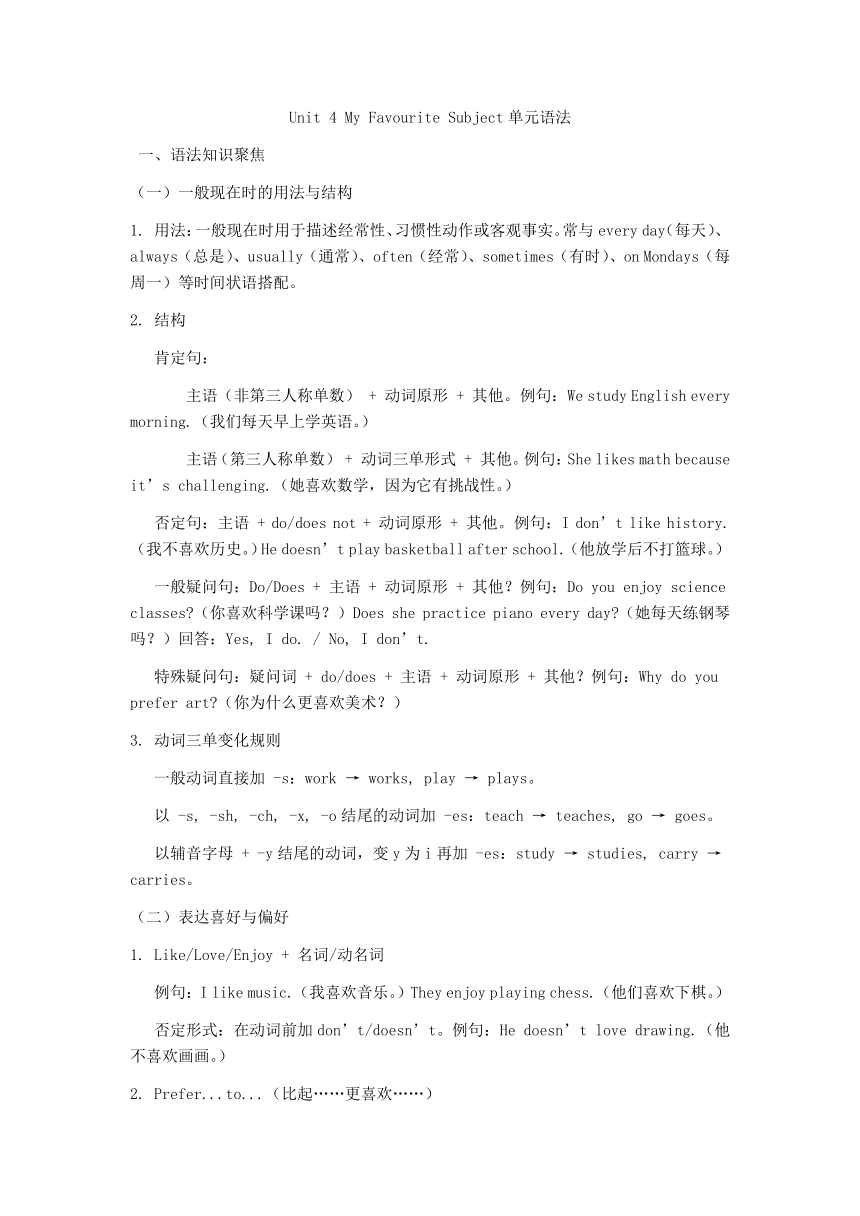
Unit 4 My Favourite Subject单元语法 一、语法知识聚焦 (一)一般现在时的用法与结构 1. 用法:一般现在时用于描述经常性、习惯性动作或客观事实。常与every day(每天)、always(总是)、usually(通常)、often(经常)、sometimes(有时)、on Mondays(每周一)等时间状语搭配。 2. 结构 肯定句: 主语(非第三人称单数) + 动词原形 + 其他。例句:We study English every morning.(我们每天早上学英语。) 主语(第三人称单数) + 动词三单形式 + 其他。例句:She likes math because it’s challenging.(她喜欢数学,因为它有挑战性。) 否定句:主语 + do/does not + 动词原形 + 其他。例句:I don’t like history.(我不喜欢历史。)He doesn’t play basketball after school.(他放学后不打篮球。) 一般疑问句:Do/Does + 主语 + 动词原形 + 其他?例句:Do you enjoy science classes (你喜欢科学课吗?)Does she practice piano every day (她每天练钢琴吗?)回答:Yes, I do. / No, I don’t. 特殊疑问句:疑问词 + do/does + 主语 + 动词原形 + 其他?例句:Why do you prefer art (你为什么更喜欢美术?) 3. 动词三单变化规则 一般动词直接加 -s:work → works, play → plays。 以 -s, -sh, -ch, -x, -o结尾的动词加 -es:teach → teaches, go → goes。 以辅音字母 + -y结尾的动词,变y为i再加 -es:study → studies, carry → carries。 (二)表达喜好与偏好 1. Like/Love/Enjoy + 名词/动名词 例句:I like music.(我喜欢音乐。)They enjoy playing chess.(他们喜欢下棋。) 否定形式:在动词前加don’t/doesn’t。例句:He doesn’t love drawing.(他不喜欢画画。) 2. Prefer...to...(比起……更喜欢……) 结构:主语 + prefer + 名词/动名词 + to + 名词/动名词。 例句:I prefer math to English.(比起英语,我更喜欢数学。)She prefers reading to watching TV.(比起看电视,她更喜欢阅读。) (三)疑问词的使用 1. What:询问具体事物或科目。例句:What is your favourite subject (你最喜欢的科目是什么?) 2. Why:询问原因。例句:Why do you like PE (你为什么喜欢体育课?) 3. When:询问时间。例句:When do you have geography class (你们什么时候上地理课?) 4. Who:询问人物。例句:Who teaches you Chinese (谁教你们语文?) (四)时间表达 1. 具体时间点:at 8:00(在8点)、in the morning(在早上)、after school(放学后)。 2. 频率:every Monday(每周一)、twice a week(一周两次)。 3. 例句:We have chemistry class at 10:00 on Fridays.(我们周五10点上化学课。)They play sports after school every day.(他们每天放学后做运动。) 二、学以致用 (一)动词填空(用一般现在时) 1. My mother often _____ (cook) delicious meals for us. 2. _____ (Do) your brother _____ (get) up early every morning 3. The students _____ (not have) a PE class on Sundays. 4. He _____ (go) to the library after school to read books. 5. How _____ (do) your sister _____ (get) to school (二)句型转换 1. I like reading books in my free time.(改为否定句) → I _____ _____ reading books in my free time. 2. Does Tom play football with his friends on weekends (改为肯定句) → Tom _____ football with his friends on weekends. 3. They have English classes three times a week.(对划线部分提问) → _____ _____ do they have English classes 4. “I prefer history to math,” said Jack.(改为间接引语 ... ...
~~ 您好,已阅读到文档的结尾了 ~~